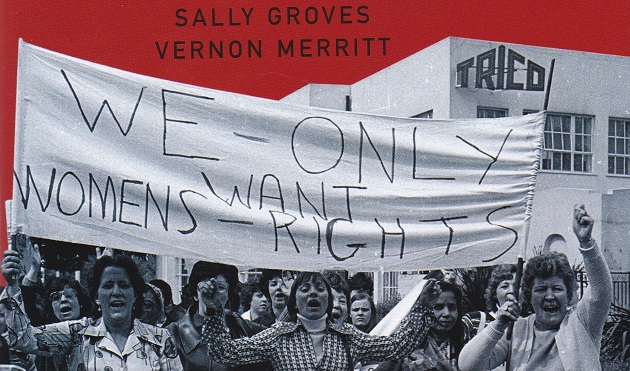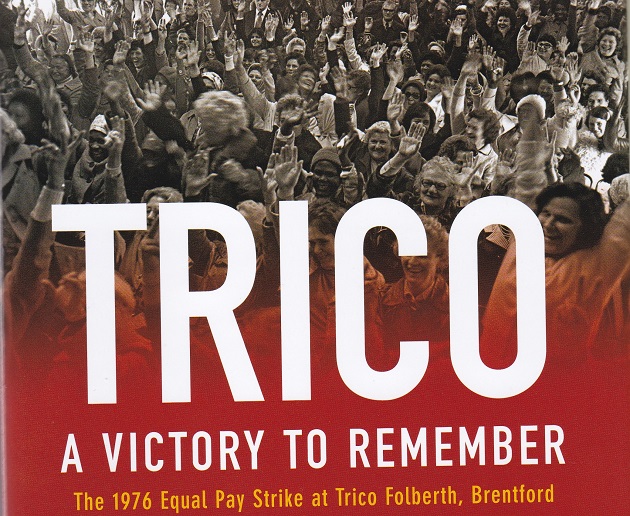350 Women Strike At Trico Factory
Striking for equal pay with men in 1976

Partial cover of "Trico: A Victory to Remember: The 1976 Equal Pay Strike at Trico Folberth, Brentford", Sally Groves and Vernon Merritt
|
“May 24 was a mild, overcast day with no hint of the heatwave to follow that long, hot summer of 1976. It was the day 400 women voted in West London’s Boston Manor Park, to take strike action for equal pay.” (Sally Groves)
In 1976, one of the most far-reaching equal pay strikes was successfully won at the Trico-Folberth factory in Brentford. An American company that had set up in West London in the thirties, Trico made windscreen wipers and employed both men and women who were in the AEU trade union.
“The best paid jobs were in factories. So I went down the Job Centre and that how I came to work at Trico, towards the end of 1975. I worked on the blades. Arms and blades, assembling arms and blades for the windscreen wipers, but they also made other accessories for the car trade, so it was one of the main employers in the area. It was quite a big factory, I mean 1,600… There had been a night-shift but because of the downturn in the economy around 1975, the company announced that they were going to close the night-shift. The men, five at all, were offered alternative assembly work on the day shift alongside the women. At the end of our 40-hour week, if they achieved the same performance as one of the women they came away with £6 – £6.50 more than the women at the same speed. That was dynamite!”
(Sally Groves)
It began on the 24th May 1976 when all 350 women workers in the factory walked out after the management refused to eliminate the £6 differential between male and female wages, despite the implementation of the Equal Pay and Sex Discrimination acts the year before. Yet in the intervening years the strike has been overlooked in contrast to the Ford women sewing machinists’ strike of 1968 and the Grunwick strike that started three months into the Trico dispute.
“It all came about after the Trico night shift was closed down with many taking redundancy but five male operators opting to be transferred to the day shift where they began to work alongside the women on the assembly lines.
This was the company’s first big mistake. Up to then production workers had been kept gender segregated — an easy means of maintaining cheap rates for women. Now the cat was out the bag. When the women compared their piecework slips with the men they were earning about £6.50 a week less than the men doing identical work on the same assembly line. It was incendiary.

Partial cover of "Trico: A Victory to Remember: The 1976 Equal Pay Strike at Trico Folberth, Brentford", Sally Groves and Vernon Merritt
It all coincided with Barbara Castle’s introduction of the Equal Pay Act of 1970 that had finally become law at the end of 1975. This raised expectations that equal pay was now a right.
In the face of the new situation Trico claimed that the men were a “historical anomaly” and suggested their pay be frozen until the women “caught up.” This came to be known as the “red circle” case approach. The women and their union district secretary called it “equal pay in reverse.”
Initially the women were ignored by both the management and male workers inside the factory. However the women persevered and organised a round the clock picket of the factory that resisted numerous attempts from the management to break the strike and lead to violence and clashes with police as the women refused to let trucks and coaches with strike breakers passed the picket line. This gained the women publicity and they began to send contingents around the country to attract financial support for their campaign and to organise the blacking of Trico products.
“The company then made the extraordinary decision — the first in history — to take the case to the tribunal confident it could rely on the loopholes in the new EPA.
Likewise, for the first time in history, the strike committee and the AUEW Southall District decided to boycott the tribunal recognising that their strength lay in collective bargaining to negotiate a settlement. They were not prepared to put their fate in the hands of unrepresentative bodies and legal processes.”
The management attempt to resolve the situation through an industrial tribunal, which was ignored by the women due to the lack of success other women workers had achieved this way.
The women ignored a tribunal decision on equal pay and stayed out on strike for twenty-one weeks, leading to the Great West Road, where the factory was located being dubbed the ‘Costa del Trico’. (Equal pay had not advanced in the private sector since 1945, despite a Royal Commission (1946), although it was introduced in the public sector in 1955).
“The Trico women and the smaller number of loyal men that supported them were totally unprepared for what lay ahead. They soon learnt the need to set up a strike committee and organise picketing rotas which later became 24-hour pickets to battle the mercenary-style convoys — organised by the company in collaboration with the police — that smashed through the picket lines.
Social security offices were occupied by strikers claiming hardship benefit and delegations organised that travelled the length and breadth of Britain raising hardship funds.
“The response was breathtaking with financial and practical support pouring in from hundreds of factories, the miners, Sheffield steel workers, print-workers, public-sector staff, trades councils, constituency Labour Parties, the Women’s Liberation Movement and Working Women’s Charter, even pensioners.
The picket line became a veritable who’s who of the best of the trade union, labour and women’s movement. It was an indefatigable campaign that defied the tribunal decision against the women and they held out until the company finally capitulated and paid the rate for the job.”
After a record breaking 21 weeks, it was announced on Friday October 15th at a mass meeting that the Strike Committee and union officials had negotiated a return to work with the employers conceding all demands and establishing a common payment by results wage, regardless of sex. This marked an important victory for female workers across Britain and placed the question of sexual inequality for working women firmly in the public eye. They served as an inspiration to women from all backgrounds across the country to stand up and challenge their status as second-class citizens, which has left a lasting legacy to this day.
As Trico veteran Sally Groves points out: “Much of the industrial strength of the unions that supported the Trico strikers, whole industries and entire communities have been destroyed since then, especially by Thatcher, with privatisation and fragmentation of our public services carrying on apace under Cameron’s government.
The Trico women would not have been able to achieve their right to equal pay under the draconian provisions of the new Trade Union Act 2016.
At Trico the women as a section of the workforce voted by a show of hands for strike action. Secret balloting has been part of employment law for years but based on a simple majority. The new Act requires over 50 per cent of the entire workforce to vote for strike action for it to proceed.
The vast majority of the men at Trico were hostile to the very idea of equal pay and kept working so the Trico women would now be defeated in a workforce ballot proposed.
Almost certainly our union would have been unable to meet all the requirements regarding picket supervisors under this new Act. Any breaches of the new restrictions can attract criminal charges.
This is frightening stuff for anyone and intended to be so. At Trico many women had husbands who continued working, the “scabs.” Pressures on people to stay away from the picket line will be even greater under the new law.
A proposal to bus in agency workers to replace strikers was not included in the 2016 Act. But it is sinister that the repeal of the ban on employers hiring agency workers to break strikes was announced by the Tory government last year. Their intention remains to bring in this provision at some point.
The women at Trico were the production workers. If bringing in strike breakers becomes lawful the whole rationale for withdrawing your labour in a dispute is destroyed.
Current equal pay legislation is much stronger than in 1976 but new hurdles are being put in the path even of those taking the legal route, particularly the tribunal fees introduced by the Tories in 2013. This means most workers now face a bill as high as £1,200 to take a case to tribunal.
In face of this I believe our trade union and women’s movement history of struggle is highly relevant today especially for a younger generation often with little knowledge of past working-class campaigns and battles that are filtered out by our media and Establishment.
Trico is a shining example of what can be achieved by ordinary working people, the women and their supporters standing up for their rights and sticking together. With local trade union officials dedicated to their fight the Trico women brought a multinational to heel backed by the organised power of their trade union.”
A fine strike song was written during the dispute:
Come to the Costa del Trico
Land of laughter and wine
Take care what you do
Or we’ll cut you in two
If you put one foot across this line.
Don’t be tempted, young men
Don’t you tangle with them
For these are not commonplace ladies
Their fury when goaded
Their wrath when exploded
Escapes like a bat out of Hades
Now you have to decide
Whether you are on their side
(…)
Cross them once you young men
You won’t cross them again
The notorious women of Trico. OLE!”
Trico closed in 1992 when the company moved production to Pontypool in Wales.
Jim Storrar, with quotes and pictures from Sally Groves, author of "Trico: A Victory to Remember: The 1976 Equal Pay Strike at Trico Folberth, Brentford"
May 22, 2019